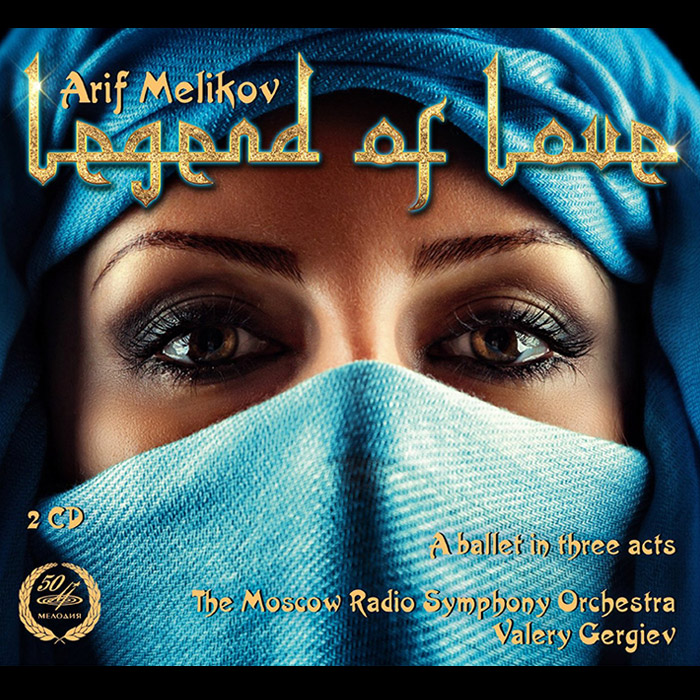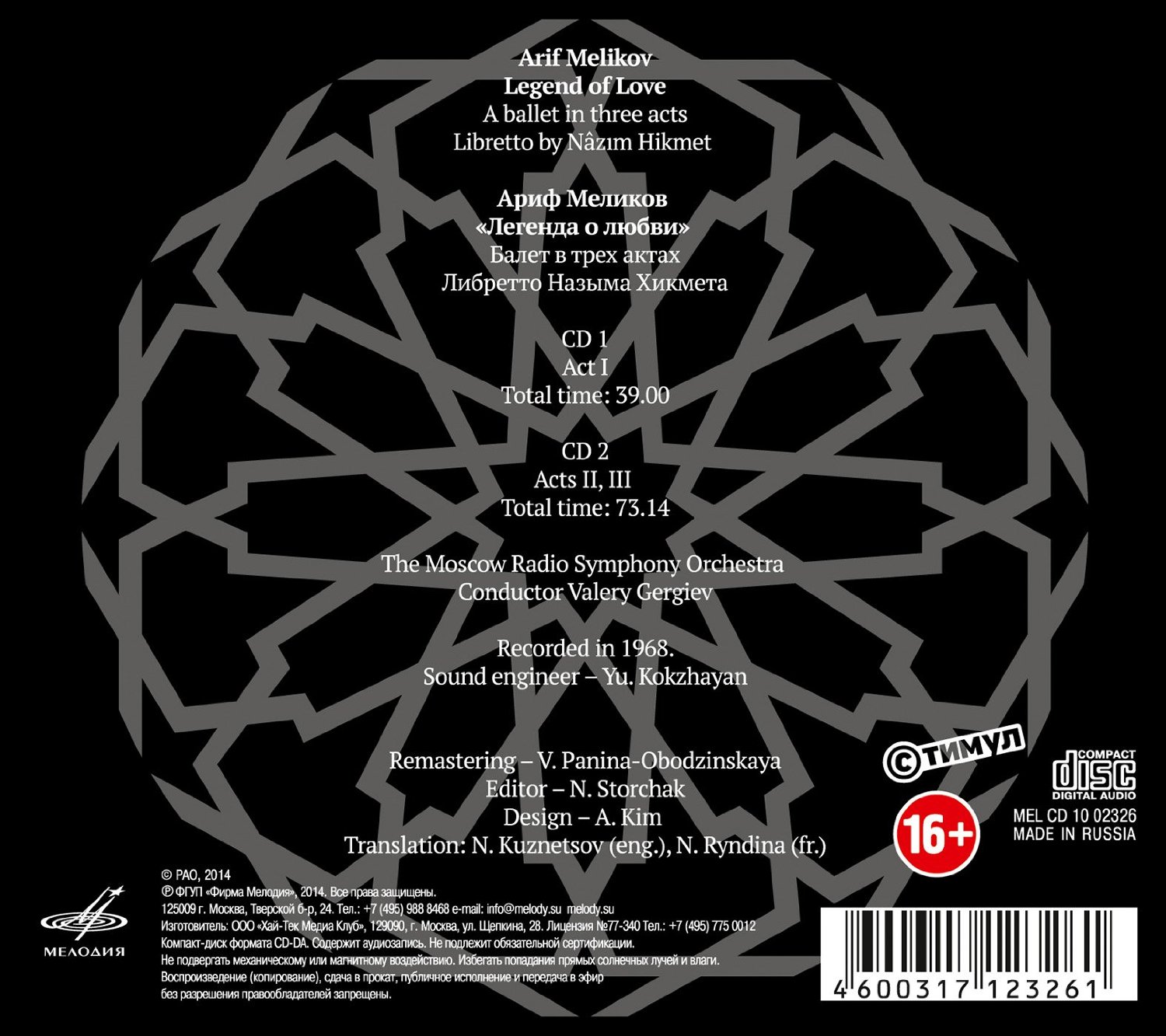Share This
Album at a Glance
Tags
Related Posts
- Walter Braunfels: Orchestral Works, Vol. 2 / BBC Concert Orchestra; Johannes Wildner
- Steve Wilson & Wilsonian’s Grain: Live in New York - The Vanguard Sessions
- Music from America & Abroad for Oboe, Bassoon & Piano / John Dee, oboe; Timothy McGovern, bassoon; Cara Chowning, piano
- Joanna Wallfisch: The Origin of Adjustable Things
Arif Melikov (b.1933): Legend of Love, a ballet in three acts / Moscow Radio SO; Valery Gergiev
Posted by Paul Ballyk on May 6, 2015 in Modern | 0 comments
Here's one for lovers of lush, romantic orchestral scores. The ballet Legend of Love by Azerbaijani composer Arif Melikov was completed in 1961, only a year and a half after the composer had graduated from the Baku Conservatory. It promptly premiered on the stage of the Leningrad Kirov Theatre and four years later was produced at the Bolshoi. In these technically secure and passionately committed performances, a young Valery Gergiev leads the Moscow Radio Symphony Orchestra. The 1988 studio recording has been beautifully remastered by Melodiya.
Some quick geography: historically, the Azerbaijan region included a larger area that was part of Persia (Iran). Present day Azerbaijan is bordered by the Caspian Sea in the east, by Iran in the south, Armenia to the west and Georgia and Russia to the north. The story of Legend of Love is derived indirectly from the tale Khosrow and Shirin by the 12th century Persian poet, Nizami Ganjavi. It was given a 20th-century renewal in the verses of Farhad and Shirin by Turkish poet Nazim Hikmet, and it is on this version that the story of Melikov's ballet is based.
Nothing sounds contrived or artificial here, as can occur when Western composers seek to evoke a Far Eastern or Persian atmosphere in their music. Melikov writes the music that is in his blood with a splendid dramatic sense, boundless orchestral color and a wonderfully effective 20th-century 'edge' to his harmonies. The composer wrote: "I'll admit there has always been the sound of tragic sadness in my symphonic music," which seems characteristic of much of the music composed in the Soviet Union.
The excerpt from the ballet for you to hear in the right sidebar is from Tableau three of Act III and is the music that concludes the work. If you enjoy this, you may wish to investigate the music of Melikov's primary teacher, Kara Karayev. I wrote a recommendation for his music earlier on EA, which you can read here. Melikov went on to compose the music for two more ballets, as well as five symphonies, eight symphonic poems and scores for a number of plays and films. Hopefully, the successful release of Legend of Love will spark further recordings of his music.
Firma Melodiya presents a recording of Arif Melikov's Legend of Love, one of the most outstanding works of Soviet ballet theatre. The Azerbaijani composer, a pupil of Kara Karayev (who, in his turn, studied under Dmitri Shostakovich), synthesized the best achievements of "symphonic ballet" in Russian and Soviet music. Legend of Love (1958-1961) was one of the first large-scale works written by the 28-year-old composer, but it was this ballet that brought him worldwide fame. "The Legend helped me see the world," he remembered.
The ballet was commissioned by the Kirov (now Mariinsky) Opera and Ballet Theatre and created in close collaboration with its co-authors – choreographer Yuri Grigorovich, librettist Nâzım Hikmet, set designer Semyon Virsaladze and conductor Niyazi. "I was lucky enough to get into the environment of outstanding artists in the very beginning of my career. I dedicated one chord in the overture to each of them," the composer wrote.
Following a triumphant premiere in 1961 in Leningrad, Legend of Love was produced at the Moscow Bolshoi Theatre and then staged at many theatres of the USSR, Europe and the world. The popularity of the ballet based on the Persian legend Khosrow and Shirin about tragic love and self-sacrifice has not waned. The recording was made by the Big Symphony Orchestra of All-Union Radio and Central Television of the USSR conducted by young Valery Gergiev in 1988.
Source: Firma Melodiya
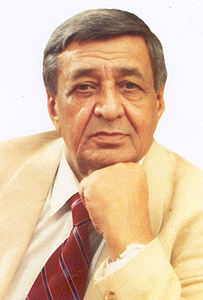 Arif Melikov |
Arif Melikov, composer Arif Melikov (also Malikov; born September 13, 1933 in Baku) is an Azerbaijani and Soviet composer. He graduated from the Baku Conservatory with a degree in composition in 1958. He shot to fame in 1961 when his first major work Legend of Love was staged at the Kirov State Academic Theatre of Opera and Ballet in Leningrad (present day St. Petersburg) and received nationwide acclaim. The ballet has been staged in several countries in Europe and is regarded as one of the finest works emerging from the former Soviet Union. The ballet is based upon the legend of “Farhad and Shirin,” a story of unrequited love that was immortalized by Turkish poet Nazim Hikmet. Since then, Malikov has written music for two more ballets including Yer üzündə iki nəfər, Yer üzündə iki nəfər (“Dvoe” or “Two”) (1967) and Poem of Two Hearts (1981), as well as five symphonies & eight symphony poems. He has also written scores for a large number of films and plays and is familiar with practically all genres of music composition. Malikov had been conferred the highest award that an artist could get in the former Soviet Union — The People’s Artist of the USSR. He has also been honoured with a concert hall named after him at Turkey’s Bilkent University. He is an Honorary Doctor of Khazar University (2012), Baku. Azerbaijan After Azerbaijan gained its independence from the Soviet Union (late 1991), Malikov settled in Baku, where he teaches music in the Azerbaijan State Conservatoire. Source: Wikipedia |
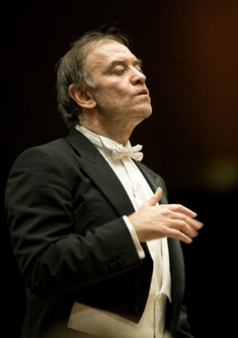 Valery Gergiev |
Valery Gergiev, conductor Valery Abisalovich Gergiev (born 2 May 1953) is a Russian conductor and opera company director. He is general director and artistic director of the Mariinsky Theatre, principal conductor of the London Symphony Orchestra and artistic director of the White Nights Festival in St. Petersburg. Gergiev, born in Moscow, is the son of Tamara Tatarkanovna and Abisal Zaurbekovich. He and his siblings were raised in Vladikavkaz in their native North Ossetia in the Caucasus. He had his first piano lessons in secondary school before going on to study at the Leningrad Conservatory from 1972 to 1977. His principal conducting teacher was Ilya Musin (Илья Мусин), one of the greatest conductor-makers in Russian musical history. His sister, Larissa Gergieva, is a pianist and director of the Mariinsky’s singers’ academy. Throughout his career, Gergiev has focused on recording Russian composers’ works, both operatic and symphonic, including those of Mikhail Glinka, Pyotr Ilyich Tchaikovsky, Alexander Borodin, Nikolai Rimsky-Korsakov, Sergei Prokofiev, Dmitri Shostakovich, Igor Stravinsky and Rodion Shchedrin. Most of his recordings, on the Philips label, are with the Kirov Orchestra, but he has also recorded with the Vienna Philharmonic. A recent undertaking, the complete Prokofiev symphonies, is with the London Symphony Orchestra. He is also in the process of recording the complete symphonies of Gustav Mahler with the London Symphony Orchestra; all are being recorded live in concert and will be issued on the London Symphony Orchestra Live label. In 2009, Gergiev and the Mariinsky launched a Mariinsky Live record label (being distributed by London Symphony Orchestra Live), with the first two recordings featuring music by Dmitri Shostakovich. Gergiev’s recording of Prokofiev’s Romeo and Juliet with London Symphony Orchestra on LSO live in 2010 was the winner of the Orchestral category and the Disc of the Year of the 2011 BBC Music Magazine Awards. Source: Wikipedia |
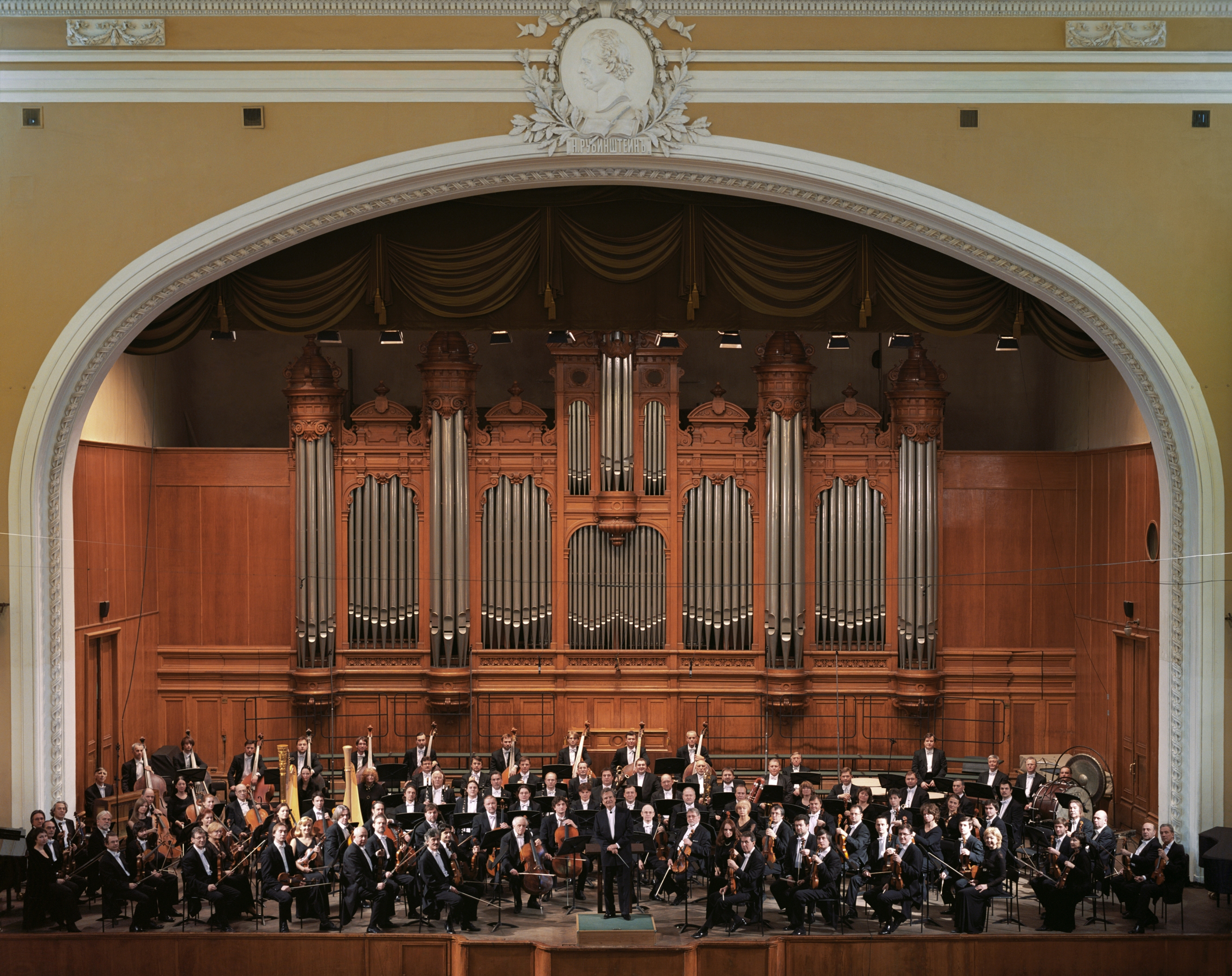 Moscow Radio Symphony Orchestra |
Moscow Radio Tchaikovksy Symphony Orchestra The Tchaikovsky Symphony Orchestra is a Russian classical music orchestra established in 1930. Originally founded as the Moscow Radio Symphony Orchestra, it served as the official symphony for the Soviet All-Union Radio network. Following the dissolution of the USSR in 1991, the orchestra was renamed in 1993 by the Russian Ministry of Culture in recognition of the central role the music of Tchaikovsky plays in its repertoire. The current music director is Vladimir Fedoseyev, who has been in that position since 1974. During Soviet times, the orchestra was sometimes known as the USSR State Radio and Television Symphony Orchestra, the USSR State Radio Symphony Orchestra, or the Symphony Orchestra of All-Union Radio and Television. Source: Wikipedia |
![]() About Paul Ballyk
About Paul Ballyk
all about Paul
Twitter •
| Thinking about purchasing this album?
Follow this link for more album details or to make the purchase. Buy it now |
“Not just recommended. Guaranteed.”
We stand behind every album featured on Expedition Audio. Our objective is to take the monetary risk out of music exploration. If you order this album from HBDirect.com and do not like it you can return it for a refund.
Arif Melikov : Iki qelbin dastani (The legend of two souls)





